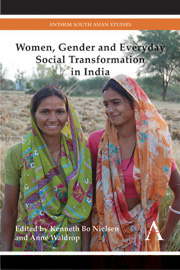Book contents
- Frontmatter
- Contents
- Acknowledgments
- Women and Gender in a Changing India
- PART I WORK, TECHNOLOGY, ASPIRATIONS
- Chapter One Today's ‘Good Girl’: the Women Behind India's BPO Industry
- Chapter Two Gender, Intersectionality and Smartphones in Rural West Bengal
- Chapter Three The Introduction of Electricity in the Sundarban Islands: Conserving or Transforming Gender Relations?
- Chapter Four Changing Consumption and the Negotiation of Gender Roles in Kerala
- Chapter Five Gender, Work and Social Change: Return Migration to Kerala
- Chapter Six Showtime and Exposures in New India: the Revelations of Lucky Farmhouse
- PART II DEMOCRACY AND THE DEVELOPMENTAL STATE
- PART III ASSERTIONS AND ACTIVISM
- About the Editors and Contributors
Chapter Four - Changing Consumption and the Negotiation of Gender Roles in Kerala
from PART I - WORK, TECHNOLOGY, ASPIRATIONS
Published online by Cambridge University Press: 05 October 2014
- Frontmatter
- Contents
- Acknowledgments
- Women and Gender in a Changing India
- PART I WORK, TECHNOLOGY, ASPIRATIONS
- Chapter One Today's ‘Good Girl’: the Women Behind India's BPO Industry
- Chapter Two Gender, Intersectionality and Smartphones in Rural West Bengal
- Chapter Three The Introduction of Electricity in the Sundarban Islands: Conserving or Transforming Gender Relations?
- Chapter Four Changing Consumption and the Negotiation of Gender Roles in Kerala
- Chapter Five Gender, Work and Social Change: Return Migration to Kerala
- Chapter Six Showtime and Exposures in New India: the Revelations of Lucky Farmhouse
- PART II DEMOCRACY AND THE DEVELOPMENTAL STATE
- PART III ASSERTIONS AND ACTIVISM
- About the Editors and Contributors
Summary
In this chapter, I will explore the interrelationship between gender and Kerala's increasing consumption of household appliances, beauty products, convenience foods and clothing. I will examine gender ideals and negotiations in the home and family, as well as the powerful notion, emphasized both in women's reform movements from the early twentieth century and in product marketing of the past couple of decades, that consumption of household appliances is synonymous with women's liberation. This analysis of the interplay between gender and consumption draws on ethnographic research conducted by the author in Kerala from 2001 to 2004, as well as a review of more recent literature from Kerala.
This analysis should be of interest to two audiences: first, those who are engaged in gender studies in Kerala and in the gap between the many positive indicators of women's well-being and gender equality on the one hand, and the realities of power and task distribution in home and family on the other; second, researchers interested in theorizing the transformation of consumption in rapidly growing economies such as those of India, China and Brazil. My argument is that the nature and direction of these transformations cannot be fully grasped without a gender perspective that is grounded in place; in other words, a full understanding of changing consumption will not be possible without a lens that encompasses not only the extending web of global capitalism, but also the sociocultural drivers of bottom-up demand.
- Type
- Chapter
- Information
- Women, Gender and Everyday Social Transformation in IndiaA Revisionary History, pp. 63 - 74Publisher: Anthem PressPrint publication year: 2014



